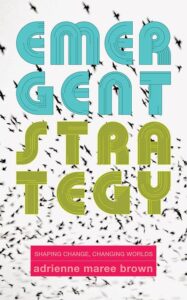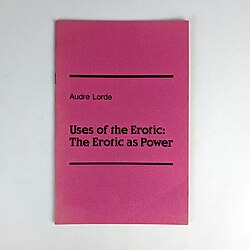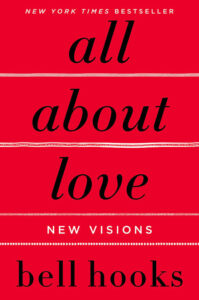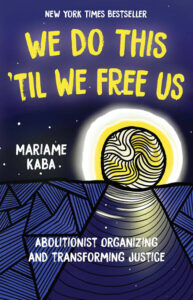Your next five must-reads for revolutionizing how you think, feel, and organize.
1) Emergent Strategy by Adrienne Maree Brown
We have all had that moment where we are in a conversation with some people and our chat with them is blowing up with ideas. The interruption of one idea by another can sometimes look messy, but that moment feels magical. Emergent Strategy is the book that can show you how you can create a movement out of that messy magic.
This book is fire 🔥 because Brown teaches us to see social change like an ecosystem where small shifts ripple into massive transformations. The book is packed with bite-sized “patterns” you can experiment with today, ideas like adaptive planning, decentralized leadership, fractal love, etc.
This book is perfect for anyone interested in creating social change (right from where you are) but do not want to ensure the feeling of getting stuck in stiff organizational charts. With this book, you will learn to pivot, iterate, and bloom where you’re already planted.
2) Uses of the Erotic by Audre Lorde
The reason why you scroll different social media platforms in your free time is because you sometimes need to escape your reality, but Audrey Lorde begs to differ. Audre Lorde thinks you can only be saved by realness.
How?
By embracing the erotic side of life! 😲😮
Yes, you heard that right!
Lorde flips “erotic” from the plane of kink-only ideas to radical life-force. This book presents the erotic as our deepest creative and connective power.
It is a short, lyrical manifesto on claiming joy, pleasure, and authenticity in a world that profits from our shame. This book is ideal for anyone feeling numb. This will reignite your spark for love, art, and collective resistance.
3) All About Love by bell hooks
This is one of my two favorites on this list.
We presently live in a world where we all long to find our own person. You’re tired of that friend or that boyfriend that always ghosts you when things get real. You want the kind of love that can stick to you through thick and thin.
hooks shows us how to love better, whether in our movements and our small friend squads.
Love, I think, is the most mystified idea in the world. hooks is the best writer to demystify love, in my opinion.
Shulamith Firestone‘s Chapter 6 of Dialectic of Sex stands at a close second place. Love to most people is about flowers 🌺, dinner dates 🥰 and “breakfast”, but hooks probes deep to show us how to experience something better.
How to love yourself better and how to love others better was made easy in this book. She lays out a clear definition, pathways to practice, and hard truths about patriarchy’s hold on our hearts.
This book is a mixture of memoir, cultural critique, and self-help that reads like chatting with your wisest friend. This is an essential read for movements hungry for genuine solidarity. This is necessary for social changemakers because you can’t build community on burnout and guilt, whether yours or that of others.
4) The Wretched of the Earth by Frantz Fanon
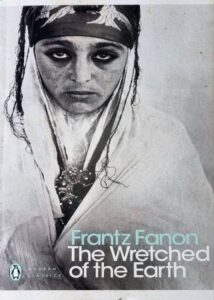
This is my other favorite. Many people read this book to justify violence and “vawulence” but Fanon’s book is trying to show us why we often become what we once condemned. If you’re wondering why you keep finding potential dictators in a space that fights for democracy, why you keep finding patriarchy in a space that fights for feminism, why you keep finding greed in a space that fights for socialism, or why you keep finding opportunism in a space that fights for mutualism, look no more.
Fanon explains the psychic residue of brutality, and what life under brutal systems of inequality does to the brains of all of us. To make this more relatable, have you experienced gender conditioning, gender roles and gendered violence in same-gender relationships? This book explains the psychology behind that.
While this book remains a classic balm and blueprint for anti-colonial struggle, it is also generally unflinching about violence, trauma, and the pitfalls of power.
Fanon’s deep dive into how oppression warps minds (colonial and post-colonial alike) still rings true in Black, Indigenous, and Global South contexts today. A must-read if you want your radical heart tempered with historical clarity, and if you’re ready to confront the darkness in you.
5) We Do This ’Til We Free Us by Mariame Kaba
Most social change organizers assume money is the bicycle 🚲 of the gospel, but this book reveals one most basic resource that we often pay no attention to.
Passion.
You ever want to organize something that everyone is passionate about and feel like what left is the material resources to make it happen?
This book teaches revolutionary resources that leverage that spontaneous energy to use to build long-lasting community care.
Kaba’s writing pulses with hope.
This book teaches social changemakers how to use the will (especially the general goodwill of the cause) to find a way.
This is detached from NGOs’ model of getting resources and steeped in grassroots abolitionist practice.
The essays also feel like hood-grown wisdom from jail visitation to transformative justice, and to the power of joy in survival.
For organizers tired of top-down “solutions,” here’s a living guide to building solidarity networks from the ground up.
These five books cover strategy, pleasure, love, trauma, and abolition, and I think these are all the bases to cover for a 360° revolution of self and society.
Pick one this week.
Share a quote in your stories.
Tag a friend.
Let’s grow together one page at a time.
If you’d like a soft copy of any of these books, join us here and make a request:


